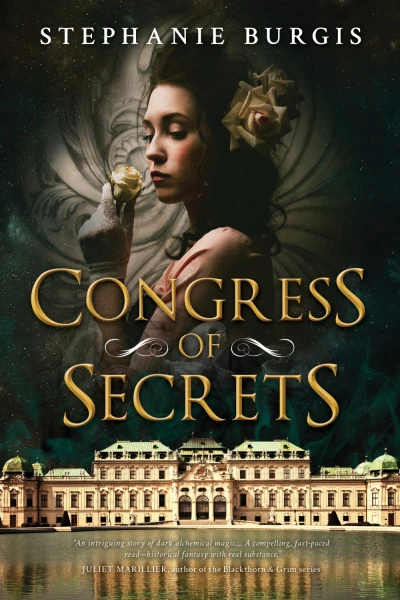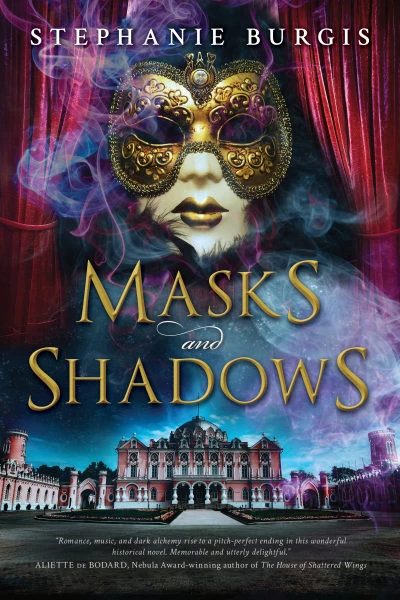 Risingshadow has the honour of publishing a guest post by Stephanie Burgis.
Risingshadow has the honour of publishing a guest post by Stephanie Burgis.
Stephanie Burgis was born in Michigan, but now lives in Wales with her husband, writer Patrick Samphire, and their children. Before becoming a fulltime writer, she studied music history as a Fulbright Scholar in Vienna, Austria, and worked as a website editor for a British opera company. She has published over thirty short stories for adults. Kat, Incorrigible (US)/A Most Improper Magick (UK) won the Waverton Good Read Children's Award in 2011 for Best Début Children's Novel by a British writer. It was followed by Renegade Magic/A Tangle of Magicks and Stolen Magic/A Reckless Magick.
She is also the author of the historical fantasy novels Masks and Shadows (Pyr, April 2016) and Congress of Secrets (Pyr, November 2016).
Click here to visit her official website.
(Photo by Patrick Saphire.)
GUEST POST BY STEPHANIE BURGIS
"The past is a foreign country: they do things differently there.”
I read that line (originally from an L.P. Hartley novel; quoted by dozens of academics ever since) for the first time when I was in my mid-20s.
It struck me hard.
I was in grad school at that point, studying 18th-century Viennese opera and politics, and I realized: it was true. I’d spent so much time living in Vienna, walking in the footsteps of the composers I was studying, and taking part in contemporary Viennese society (attending the University of Vienna and even teaching in a Viennese school)...but none of that changed the essential fact that I would never, ever be able to completely understand what it had been like to walk through that city in earlier centuries.
The culture has changed too much since then, in a thousand tiny ways that all add up to cosmic shifts.
I could pore through delicate eighteenth-century manuscripts and opera scores, reading the handwriting left behind centuries earlier; I could memorize reams of information about daily life and devour letters and diary entries left behind; but I still couldn’t put myself completely in the minds of the people who had written them. Not at a bone-deep level.
I absolutely loved trying, though! I loved making that imaginative reach - stretching as hard as I could to try to touch another century. It was the impulse that drove me to study history: that magical feeling of leaping across time...
 ...and it was exactly the same impulse that had led me to love fantasy ever since I first discovered The Lord of the Rings as a kid. I loved immersing myself in a different culture and a different world, with a different set of rules to govern daily lives. It felt mind-bending and extraordinary – liberating, even. There wasn’t just one way to imagine the world after all. Reading both fantasy and history gave me a dizzying sense of freedom.
...and it was exactly the same impulse that had led me to love fantasy ever since I first discovered The Lord of the Rings as a kid. I loved immersing myself in a different culture and a different world, with a different set of rules to govern daily lives. It felt mind-bending and extraordinary – liberating, even. There wasn’t just one way to imagine the world after all. Reading both fantasy and history gave me a dizzying sense of freedom.
So maybe it only makes sense that I’ve been driven as an author to write historical fantasy, mingling those two great loves together.
I collected 19th-century letters and memoirs and paced the cobblestoned inner streets of Vienna as I plotted out the intrigues of my novel Congress of Secrets (set at the 1814 Congress of Vienna); I studied the letters and financial records left by Joseph Haydn as I researched his jewelbox of a late-18th-century opera house at Eszterháza Palace in Hungary for Masks and Shadows. I worked as hard as I could to get all of the historical details right in both of them...
...But then I added dark alchemy circulating behind the scenes. It’s a type of alchemy, in fact, that fits some of the real models formulated by 18th-century philosophers, including a few we now think of as the fathers of modern science. Sir Isaac Newton himself theorized the existence of elemental creatures who might live beyond “the aetheric veil,” just past the limits of our human understanding.
In the late 18th century and early 19th century, that still seemed genuinely possible to rational, scientifically-minded people...because their understanding of the world was so different to ours.
The past is a foreign country...
...So make an imaginative leap.
What if there really was an aetheric veil? What if those theories had been right?
And what would have happened if an alchemist had found a way to lift that veil?
 It was so much fun to design a magical system (which I used in both Masks and Shadows and Congress of Secrets, although they’re each standalone novels) that fit with real historical scientific theories. It was delicious to imagine how that alchemy might have worked behind the scenes of real historical events, and how it would have affected fascinating historical characters as well as my own invented ones.
It was so much fun to design a magical system (which I used in both Masks and Shadows and Congress of Secrets, although they’re each standalone novels) that fit with real historical scientific theories. It was delicious to imagine how that alchemy might have worked behind the scenes of real historical events, and how it would have affected fascinating historical characters as well as my own invented ones.
(I first discovered Newton’s theories at an Oxford conference where I listened to a fabulous paper about them…and I was utterly useless as an academic for the rest of the day! I didn’t take in any of the other speakers’ papers, no matter how interesting they might have been. I just kept on scribbling more and more notes to myself for my novels, blown away by the sheer number of story ideas that those theories had sparked in me!)
There’s a reason that historical fantasy works so well. We know people did things very differently back then. They had completely different lists of what was possible or impossible in everyday life. Whenever we read about the past, we’re already having to make a leap into a world full of distinctly different rules, social strictures and beliefs – a different world from the one we live in, where so many different rules apply. Why not take that extra step? It’s only a baby step, after all, as compared to imagining magic in our own present day.
I loved immersing myself in that subtly changed world in Masks and Shadows and Congress of Secrets. I hope that readers enjoy visiting it too!